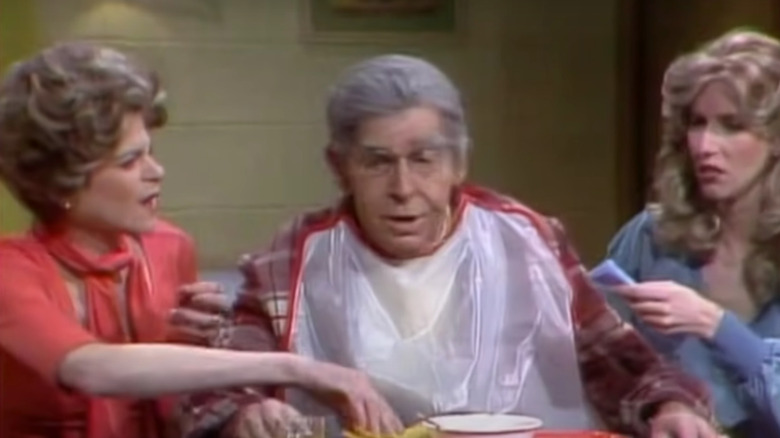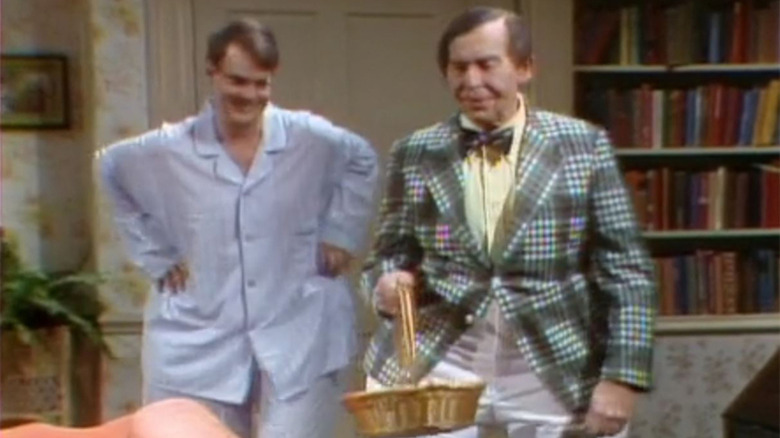The 1979 SNL Episode That Wasn't Seen Again Until 2003
For a live television show that is assembled on the fly over a six-day period, "Saturday Night Live" has suffered remarkably few on-air disasters. The f-bomb has been uttered more than a few times, Jimmy Fallon used to co-host the Weekend Update, and there was the whole Ashlee Simpson lip synching snafu. But SNL, overall, goes on as it must.
This doesn't mean every episode has been a party. If you've read Doug Hill and Jeff Weingrad's "Saturday Night: A Backstage History of Saturday Night Live" or Tom Shales and James Andrew Miller's "Live from New York: The Complete, Uncensored History of Saturday Night Live as Told by Its Stars, Writers and Guests," you know there've been behind-the-scenes scraps, scrapes, and scenic malfunctions. Worst of all, there have been multiple lousy guest hosts: stars who didn't get the show or bristled against its collaborative nature. Madonna, Steven Seagal, Paris Hilton, Andrew Dice Clay, and Donald Trump were notoriously uncooperative or, y'know, Donald Trump.
While those episodes were absolute train wrecks, the show's most quarrelsome guest arrived early in SNL's run, and represented the old guard of TV comedy the series was aggressively flouting. Milton Berle aka "Mr. Television" was the king of the medium's golden age. As the host of NBC's "Texaco Star Theatre," he essentially invented the concept of appointment viewing. Everyone with a television in their living room made sure they were tuned in at 8 PM on Tuesday evenings for his variety show hysterics.
When Berle was asked to return to NBC 20 years after the end of his boob-tube reign to host SNL, he arrived to Studio 8H with an air of ribald entitlement. It was a week no one who worked on the show would ever forget — especially Gilda Radner and writer Alan Zweibel.
When Radner and Zweibel met the boy
According to Hill and Weingrad's book, Berle blew into 30 Rockefeller Plaza like he owned the place. "He came in with the attitude 'I am TV,'" said one writer. "Not 'I used to be TV,' but 'I am TV.'" He reverted to his tried-and-true shtick, which evidently upset everyone except for John Belushi, who worshiped Uncle Miltie.
Berle was a nightmare backstage. He bullied the staff, repeatedly veered off script, and prowled the halls in undergarments that barely contained his legendary physical endowment. The only writer he vibed with was Zweibel, who'd written jokes for Berle at various Friar's Club roasts in the early 1970s. While pitching jokes to Berle in his dressing room prior to the episode, Zweibel cracked that while he'd never met the comic, he had written numerous jokes about his allegedly gargantuan male member. Berle took this as his cue to whip it out, which left an indelible impression on Zweibel.
As he related in Shales and Miller's book:
"[H]e parts his bathrobe and he just takes out this — this anaconda. He lays it on the table and I'm looking into this thing, right? I'm looking into the head of Milton Berle's dick. It was enormous. It was like a pepperoni. And he goes, 'What do you think of the boy?' And I'm looking right at it and I go, 'Oh, it's really really nice.'"
Enter Gilda Radner just in time to witness the awkward moment, in what Zweibel compares to the dirtiest "I Love Lucy" sketch ever.
Berle edged out the edgy kids
The episode itself was a massive ego stroke for Berle. He opened with a horribly off-color monologue that was peppered with ethnic barbs torn straight out of Blanche Knott's "Truly Tasteless Jokes" books (many of which, to be fair, might've originated with him). He closed the show with an insipidly wistful medley of "September Song" and "There's No Business Like Show Business," thus completing his recalibrating of SNL to give him one last day in the sun as the king of live television (for which he received a standing ovation from the handful of people he'd planted in the audience).
Michael was so embarrassed by the episode that he buried it until the first five seasons of SNL were released to DVD in 2003. Berle's untoward behavior aside, there is something strangely poetic about the subversive new kids on the broadcast block getting subverted by the shtickiest old-school television comic alive. It's a fascinating episode on that level. And while it's awkward as hell, it can't touch the horridness of Seagal's one-and-mercilessly-done hosting gig.


